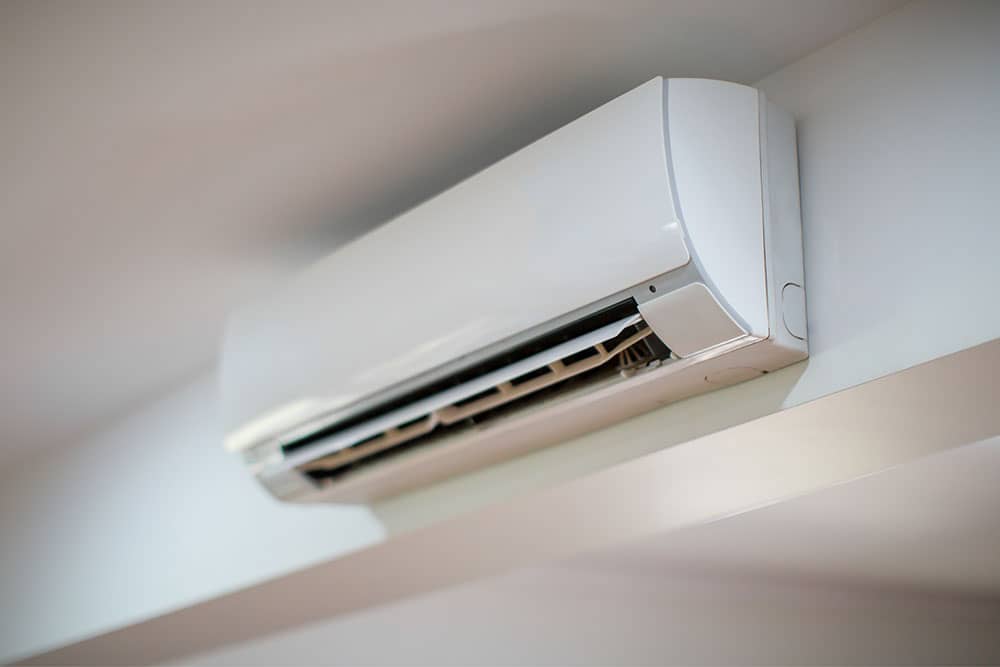Table of Contents
Learn the Top Benefits of Inverter Aircon
You might have heard the top benefits of inverter aircon in the past few years. What’s better: an inverter aircon or a split aircon unit? These are two different technologies, and both of them have their ups and downs but the major difference is that an inverter AC is the latest technology and what we all can say from our past experiences is that when it comes to tech, the newer the better.
In this piece, we will have a look at inverter technology. Its ups and downs and if you should buy or switch to an inverter aircon unit.
What is an Inverter Aircon?

An inverter is a technology in your aircon unit that has the job of saving energy. How does it perform this job? By controlling the motor speed to efficiently eliminate wasted operation in your aircon unit.
The major difference between the inverter AC from the conventional AC is that it can accelerate or decelerate the external compressor which helps in maintaining the temperature of the room.
The conventional ac (split ac) can’t do that. It operates at full speed to reach the desired temperature and then shuts the compressor down. And when the room temperature increases, the compressor starts again and cools the room from scratch. This is one of the top benefits of inverter aircon.
The inverter aircon’s outer doesn’t shut down; in fact, the compressor just slows down after reaching the desired temperature to keep the room at a constant running temperature.
This helps a lot when it comes to saving electricity. That’s why a lot of Singaporeans use this when they know the benefits of inverter aircon.
Now let’s look at some of the disadvantages and benefits of inverter aircon units. You must know that the inverter aircon unit might not suit everyone.
Advantages of an inverter AC- Benefits of Inverter Aircon
Benefits of Inverter Aircon 1: Energy Efficiency of Inverter ACs
Inverter air conitioners are known for their energy efficiency. Unlike traditional air conditioners that operate on a fixed-speed compressor, inverter ACs have a variable-speed compressor. This means that instead of completely turning off once the desired temperature is reached and then turning back on when the temperature changes, an inverter AC’s compressor operates at varying speeds to maintain the desired temperature.
This continuous but variable operation requires significantly less power, as the compressor doesn’t have to go through repeated cycles of shutting down and restarting, which is a high-energy activity. This technology ensures that the energy consumption is minimal, as the compressor doesn’t work at its full capacity at all times, thereby saving energy. The efficiency of an inverter AC can be further understood by examining the technology behind the variable speed compressor, its impact on power consumption, and how it translates to energy savings over time.
Benefits of Inverter Aircon 2: Noise Control in Inverter ACs
Inverter air conditioners are also quieter compared to traditional models. The reason for this lies in the operation of the compressor. In a standard AC, the compressor turns on and off periodically, creating a noticeable noise each time. In contrast, an inverter AC’s compressor never turns off, but instead adjusts its speed as needed. This not only reduces the loud noises associated with starting and stopping but also means that the overall operation is quieter, as the compressor is often running at a lower speed.
This feature is particularly beneficial in environments where noise levels are a concern, such as in residential areas or offices. Analyzing the design of the inverter compressor, comparing it with traditional compressors, and understanding the impact of variable speeds on noise levels can provide a deeper insight into this advantage.
Benefits of Inverter Aircon 3: Cost Savings with Inverter ACs:
The potential to save up to 50% on electricity bills with an inverter air conditioner is a significant advantage. This saving is primarily due to the variable speed compressor, which adjusts its speed and power output to match the cooling demand.
This contrasts with traditional air conditioners, which consume a lot of electricity due to their on/off cycling. Over time, the higher upfront cost of an inverter AC can be offset by the savings on energy bills. Understanding these savings requires an examination of average energy consumption patterns, cost comparisons over the lifespan of the unit, and factors that influence these savings, such as climate and usage patterns.
Benefits of Inverter Aircon 4: Air Filtration Options in Inverter ACs
Modern inverter ACs often come with advanced air filtration options. Filters like carbon, HEPA, and Blu provide additional benefits such as removing pollutants, allergens, and odours from the air. This makes inverter ACs not just cooling devices but also contributors to better indoor air quality.
Each type of filter has its own specific benefits – carbon filters are great for eliminating odours, HEPA filters capture fine particles like pollen and dust mites, and Blu filters may offer additional capabilities. Delving into the technology behind these filters, their effectiveness in different environments, and the benefits of having multiple filtration options in an air conditioning unit could provide a comprehensive understanding of this feature.
Benefits of Inverter Aircon 5: Consistent Temperature Maintenance
An inverter AC maintains a more consistent room temperature. Traditional ACs cool the room to a certain temperature and then turn off, allowing the room to warm up before kicking back in. This results in temperature fluctuations. In contrast, an inverter AC adjusts the compressor speed to maintain a steady temperature.
This constant regulation not only improves comfort but also reduces the stress on the unit, potentially leading to a longer lifespan. Exploring how maintaining a consistent temperature impacts both comfort and the mechanical wear and tear of the unit can offer a better understanding of this benefit.
Benefits of Inverter Aircon 4: Fast-Cooling Feature of Inverter ACs:
When it comes to cooling a room quickly, inverter ACs are highly efficient. Their ability to operate at varying speeds allows them to quickly reach the desired temperature. Unlike traditional ACs, which start at full power and then stop, inverter ACs can ramp up to maximum speed immediately, which cools the room more quickly.
After reaching the desired temperature, they reduce the compressor speed to maintain it, instead of turning it off. This feature is particularly beneficial in hot climates or when immediate cooling is desired. Analyzing the mechanics of how inverter ACs achieve rapid cooling and the implications for user comfort and energy consumption can provide a deeper insight into this advantage.
Disadvantages of an Inverter AC
Higher Initial Cost of Inverter ACs
Inverter air conditioners are generally more expensive to purchase than traditional non-inverter models. This higher cost is primarily due to the advanced technology used in inverter ACs. The variable speed compressor, which is the heart of an inverter AC’s efficiency and performance, is more complex and costly to manufacture than a standard fixed-speed compressor. Additionally, inverter ACs often come with additional features such as advanced air filtration systems and more sophisticated control systems, which further contribute to their higher price.
To understand this cost difference fully, one must consider the technology behind inverter ACs, the research and development costs associated with this technology, and how these factors are reflected in the retail price. Furthermore, it’s important to evaluate the long-term savings in energy bills against the upfront cost. A detailed analysis of the return on investment over the lifespan of an inverter AC compared to a non-inverter model can provide a clearer picture of whether the higher initial cost is justified.
Maintenance and Part Replacement Costs
The maintenance and part replacement costs for inverter ACs are typically higher compared to traditional air conditioners. This is partly due to the more sophisticated technology and components used in these units, such as the inverter compressor and advanced electronic controls. These parts are not only more expensive but may also require specialized knowledge and tools to repair or replace, leading to higher service charges.
To assess the impact of these costs, one should consider the frequency and cost of routine maintenance, the likelihood of major repairs, and the cost of replacement parts. Additionally, the availability of qualified service technicians and the manufacturer’s warranty and support services can also influence these costs. It’s crucial to weigh these factors against the potential energy savings and enhanced performance of an inverter AC. A detailed breakdown of maintenance schedules, common repairs, and their associated costs can offer a comprehensive understanding of this downside.
Inefficiency in Improperly Sized Units
If an inverter air conditioner is not properly sized for the room it’s intended to cool, it can lead to inefficiency and increased electricity bills. An AC unit that is too small for a large room will struggle to cool the space effectively. In an attempt to reach the set temperature, the compressor may run continuously at a high speed, leading to increased energy consumption and wear on the unit. This can negate the energy-saving benefits that inverter ACs are known for.
Understanding this issue requires an exploration of how air conditioners are sized, the importance of matching the AC unit’s capacity with the room size, and the consequences of mismatches in this regard. Factors like room dimensions, insulation, and typical usage patterns play a crucial role in determining the appropriate size of an AC unit. A detailed analysis of how an improperly sized inverter AC affects energy consumption, cooling effectiveness, and the lifespan of the unit can provide valuable insights into the importance of proper sizing.
Maintaining an Inverter Aircon Unit
Inverter air conditioners are often perceived as having higher maintenance costs, primarily due to the expense of their spare parts. These units use advanced technology, with components like variable speed compressors and sophisticated electronics, which can be costlier to replace compared to traditional air conditioners. However, this does not necessarily mean that the overall maintenance costs are higher for inverter ACs.
Inverter ACs are designed to operate more uniformly, often at lower speeds, which reduces wear and tear on the compressor and motor. This can result in fewer mechanical failures and potentially lower maintenance needs over time. The key to understanding the maintenance dynamics of inverter ACs lies in examining the balance between the cost of spare parts and the frequency of repairs. Regular maintenance, such as cleaning filters and ensuring proper installation, can help minimize the need for more costly repairs.
A thorough analysis would include the types of common repairs, the cost of spare parts for inverter versus non-inverter units, the impact of regular maintenance on reducing repair frequency, and a comparison of the long-term maintenance costs between inverter and conventional air conditioners.
Inverter aircon units increase energy bills, is it true?
The notion that inverter air conditioners increase energy bills is not entirely accurate but has some validity in specific scenarios. Inverter ACs are generally more energy-efficient than traditional ACs due to their ability to adjust the compressor’s speed to the cooling demand. This results in lower energy consumption and, typically, reduced electricity bills.
However, if an inverter AC is installed in a room that is too large for its capacity, it may not be able to cool the space efficiently. In such situations, the unit might operate continuously without effectively reaching the desired temperature, leading to higher energy usage. This inefficiency can occur with both inverter and non-inverter units.
Analyzing this issue would involve exploring the principles of inverter technology and its impact on energy efficiency, the importance of correctly sizing an AC unit for a given space, and the conditions under which an inverter AC might not result in energy savings. Additionally, a comparison of energy consumption patterns between properly and improperly sized inverter AC units in various scenarios would provide a comprehensive view of the energy efficiency claims.
Conclusion
As you have learned all the top benefits of inverter aircon. Inverter aircon units can control the room temperature elegantly and it is reported that it can save energy up to 30%. But these aircon units are expensive to buy and the maintenance is expensive as well.
When you go out to buy an aircon unit, you should know if it works best with your interests or not. Is your room medium-sized for the inverter to easily cool it off? All these elements should be taken into account before purchasing.
If the inverter is the right choice for your household or offices then it cannot get better than this. It is reported that the extra money you pay when buying and maintaining an inverter AC recovers quickly within one and a half years.
You can consult an aircon technician on whether to stay with a split ac or buy a brand inverter aircon unit. You can contact Sibehcool and we’ll arrange an expert aircon technician for you.

FAQs
What is an Inverter Air Conditioner?
An inverter air conditioner utilizes advanced technology that allows its compressor to operate at variable speeds. Unlike traditional ACs that turn on and off at full capacity, an inverter AC adjusts its compressor speed to maintain a consistent temperature, leading to improved energy efficiency and comfort.
How Does an Inverter AC Save Energy?
An inverter AC saves energy by eliminating the constant on-and-off cycling of traditional AC compressors. It modulates the speed of the compressor according to the room’s cooling needs, which minimises energy wastage and enhances efficiency.
Is an Inverter AC More Expensive Than a Traditional AC?
Yes, inverter ACs are typically more expensive upfront than traditional ACs. This cost difference is due to the more sophisticated inverter technology, which includes a variable-speed compressor and advanced control systems.
Can Inverter ACs Reduce Electricity Bills?
Yes, inverter ACs can significantly reduce electricity bills. Their energy-efficient operation means they consume less power compared to traditional ACs, leading to lower energy costs over time.
Are Inverter ACs Quieter Than Traditional ACs?
Inverter ACs are generally quieter than traditional ACs. Since the compressor doesn’t constantly turn on and off but instead adjusts its speed, this results in lower sound levels, especially during sustained operation.
What Maintenance Does an Inverter AC Require?
Inverter ACs require similar maintenance to traditional ACs, such as regular cleaning of filters and servicing. However, due to their complex components, repairs may be costlier if specialized parts or expertise are needed.
Do Inverter ACs Require Specialized Repairs or Parts?
Inverter ACs may require specialized repairs and parts due to their advanced technology. These components might be more expensive and might need technicians with specific expertise for repairs or maintenance.
How Important is Correct Sizing in Inverter ACs?
Correct sizing is crucial for inverter ACs to operate efficiently. An undersized unit will struggle to cool the space effectively, while an oversized unit can lead to unnecessary energy consumption and wear on the system.
What Air Filtration Options Do Inverter ACs Offer?
Many inverter ACs offer advanced air filtration options, including HEPA filters for allergens, carbon filters for odors, and specialized filters for specific pollutants, enhancing indoor air quality.
How Long Does it Take for an Inverter AC to Pay for Itself?
The time it takes for an inverter AC to pay for itself through energy savings varies, typically ranging from one to a few years. This depends on factors like usage patterns, electricity rates, and the efficiency of the specific model.


